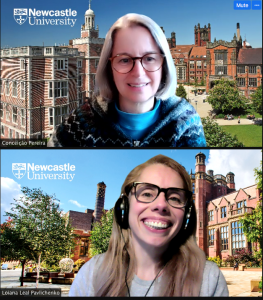With Conceição Pereira and Loiana Leal

School of Modern Languages
Faculty of Humanities and Social Sciences
What did you do?
Created a Canvas community with optional activities for students who should have been abroad as part of their degree in Portuguese.
Heroes of Portuguese was chosen as a title because Heroes is a confident word, heroes overachieve, go further, and unite.
Who is involved?
Conceição Pereira, Lecturer in Portuguese, School of Modern Languages
Loiana Leal, Lecturer in Portuguese, School of Modern Languages
Why did you do it?
Language students spend a year abroad, to immerse themselves in the culture and language or languages that they are studying. This year, because of Covid-19, Portuguese students had to return from Brazil or Portugal after only four to six weeks. Most students did not then have the full experience of living daily life in Portuguese. We decided to create the community for those students, however it grew much more than we anticipated!
The year abroad is a requirement for language students, as it is the only way in which they are able immerse in the culture and language, and to fully exercise their skills in the language of their study. The community we created provided additional resources to maintain momentum and provide topics of interest for students who were at home due to Covid-19.
How did you do it?
We began by choosing 8 topics and creating the syllabus. Normally during our language seminars, topics are relevant to current issues, so we used that principle for the online community and chose topics that related to what was happening at the time, that would matter to and engage students.
The organisation of the course as non-synchronous was influenced by a number of considerations:
• Our workload meant that it had to be self-directed
• How we were able to set up the course as a Canvas Community
• We wanted to avoid making the course mandatory.
The activities not being mandatory for the students was a very important aspect of this for us, because it was crucial that this was seen as additional to, and not a replacement for, the year abroad.
Everything is in Portuguese; it is very structured, and symbols are used to indicate each different type of task as it cuts out long text descriptions, and in language-learning it is important that students are able to identify what type of activity they are doing. Modules are all organised around the same structure, following the structure similar to those in language textbooks. Students therefore come to know what to expect from each module, which helps with self-directed learning.
A crucial part of the structure is the summary that comes at the start of each week of work. Giving students a general summary of the upcoming content, learning outcomes and a specific description of tasks will help students feel supported and have an outline to follow. In Canvas, using the inbuilt feature to link the summary directly to the tasks or items means students can navigate from the summary and will know exactly what they need to do. We used some short videos (with text underneath) to do this. Students interacted more with content that had video introductions.
We used all of the Canvas resources and tutorials we could access, regular communication with each other, and trial and error to ensure that we made best use of the new online platform and its features. For example, to communicate with students, we used Canvas Announcements, as each one is linked to a specific module or task. Discussion forums were useful to respond to questions rather than email, as one post could answer many students’ questions.
Each module had a collaborative task, for which we used Teams. Students used Discussions forums to communicate, and submitted work using Collaborative Padlets, Sway or other Office formats. Next time, we will use Group Collaboration tools in Canvas so students aren’t between two platforms. Each collaborative task was explained using an example of what was required, and all was in Portuguese.
Does it work?
As this course is optional, there are no formal feedback mechanisms, and we did not ask for feedback as we wanted to keep everything informal and pleasurable. Informal feedback was very good. Students recognised the effort we put into helping them through the summer and have mentioned it in other feedback.
High levels of participation were felt as being positive indicators of student engagement and enjoyment.
There were many interactions on the forum – where students had to do a task, reflect on it, and post the reflection on the forum. They then had to read someone else’s reflection and comment on it. We made sure we were present and interacting too. It was important that students knew that we were involved and looking at their contributions even though we weren’t “there”. We did this very carefully for the first discussions and “set the mood” for the later modules.
Student voice
From students:
“It helped me prepare for fourth year and helped my confidence when starting the year. It was good to be able to choose whether to do it or not.”
“It’s a good way to feel connected to the university when sitting at home, not knowing what’s happening with my year abroad.”
Graduate Framework
This approach develops the following attributes:
- Resilient
- Confident
- Future focussed
- Creative, innovative, and enterprising
- Engaged
- Collaborative
- Digitally capable
Staff can find out more about the Graduate Framework on the University intranet.
